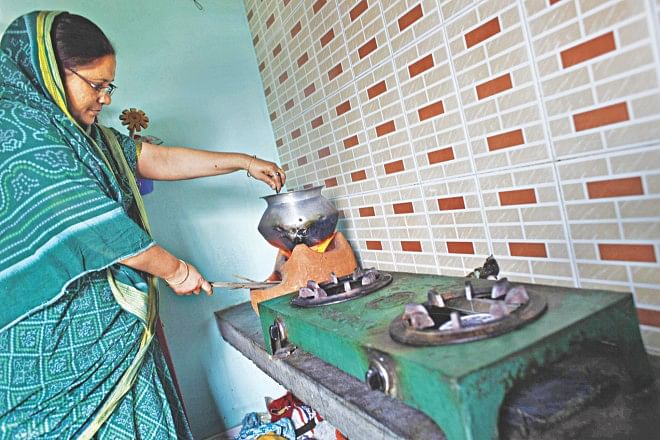Respite only after winter
Respite only after winter

Like in the previous years, residents of different parts of the capital have been suffering from acute shortage of gas supply since the beginning of winter.
Officials of Titas Gas and Petrobangla blamed chilly weather for the deposition of gas in the distribution lines resulting in the disruption of production and supply chain.
The other factors responsible for the supply shortfall include keeping both fertiliser and power plants operational and higher consumption of gas during winter and illegal connections.
The crisis may continue until the temperature rises, they said.
People of Dhanmondi, Mirpur, Pallabi, Gendaria, Indira Road, Rampura, Tikatuli, Jatrabari and Mirhajirbagh areas are the worst sufferers for want of gas.
Minara Begum, a resident of Gendaria in the city, told The Daily Star, "I cannot prepare meal from 7:00am to 9:00pm due to lack of gas in the supply line. This is happening for the last two months."
"This winter, I can cook food only at night."
Housewife Jahanara Akhtar of the same area wakes up at 5:00am every day to prepare breakfast and lunch for her family.
Fatima Urmee, a resident of Mirpur-12, said she had been facing the problem for the last two months and recently purchased an LP gas cylinder to cope with the gas crisis.
Nowshad Islam, acting managing director of Titas Gas Transmission and Distribution Company Ltd, said during winter the crisis turns worst as gas in pipelines gets compressed and its pressure falls.
Domestic consumption also increases this season as people use more gas to boil water for household purposes, he said.
The consumption in commercial and industrial sectors remains low on Friday and Saturday, and the crisis goes from bad to worse from Sunday to Thursday as consumption increases in these sectors, he added.
Mir Moshiur Rahman, director operation of Titas, claimed that gas crisis in the city this year has been less compared to last year's, as around 50 million cubic feet gas per day (mmcfd) has been added to the national grid.
"There is a gap between production and supply as Titas gets 1,500 mmcfd gas against its daily demand for around 1,900 mmcfd," he said, adding that domestic consumption increases by 20 percent during winter.
Of the total gas supplied by Titas, 32.59 percent is being used for power generation, 4.85 percent for fertiliser production, 22.26 percent for industrial purposes, 22.73 percent for captive power plants, 4.82 percent for CNG stations, 1.06 percent for commercial use and 11.69 percent for domestic use.
Moshiur said fertiliser companies and power plants were kept simultaneously operational this winter. But, it was not done in previous years considering the shortage of gas supply.
Hussain Mansur, chairman of Petrobangla, said the number of illegal gas connections to establishments in different parts of the city and its adjoining areas like Uttarkhan, Dakkhinkhan, Rupganj and Narayanganj is huge.
These illegal connections are one of the main reasons for worsening the crisis, he said, adding that there are over 24 lakh gas connections across the country. Of them, 17 lakh are in the city.
Mansur also said in many cases it becomes difficult to take action against illegal connections as local people including the users, obstruct the authority's drive to snap these connections.
However, drives against illegal connections are continuing in different areas of the city and suburbs.
According to the Titas Gas authorities, some 88,947-feet gas pipelines have been dismantled and 48 domestic connections snapped during drives in and outside the capital since September last.